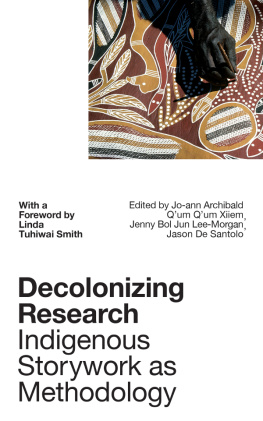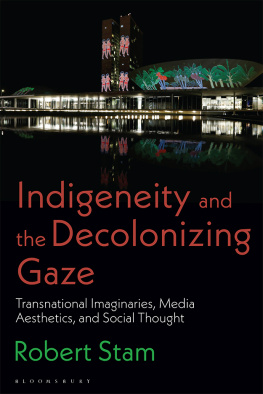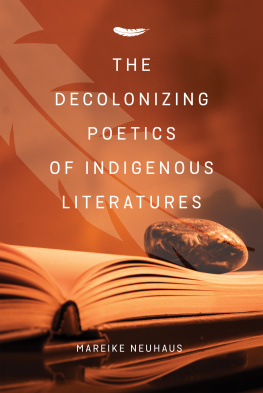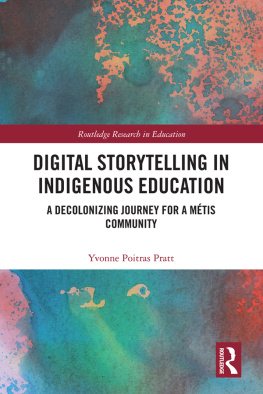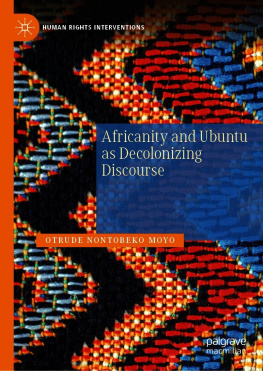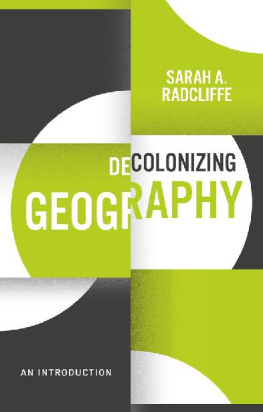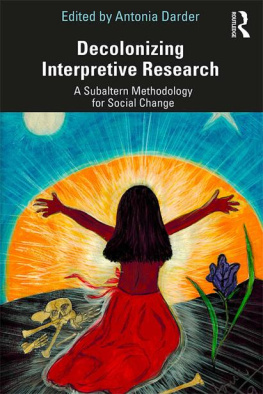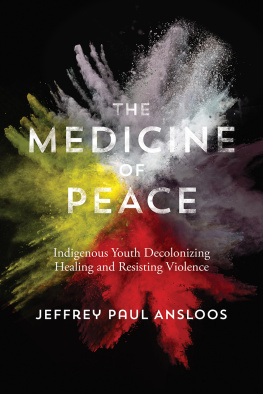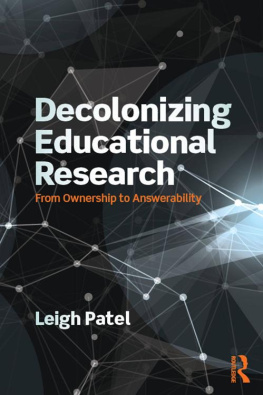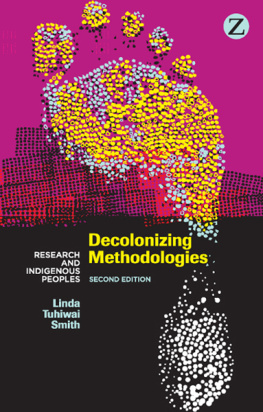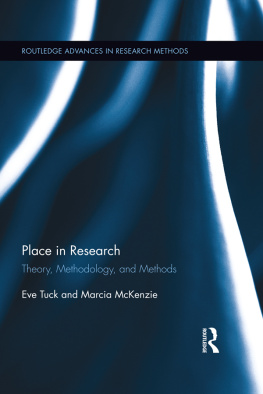Jo-ann Archibald Q’um Q’um Xiiem (editor) - Decolonizing Research: Indigenous Storywork as Methodology
Here you can read online Jo-ann Archibald Q’um Q’um Xiiem (editor) - Decolonizing Research: Indigenous Storywork as Methodology full text of the book (entire story) in english for free. Download pdf and epub, get meaning, cover and reviews about this ebook. year: 2019, publisher: Zed Books, genre: Home and family. Description of the work, (preface) as well as reviews are available. Best literature library LitArk.com created for fans of good reading and offers a wide selection of genres:
Romance novel
Science fiction
Adventure
Detective
Science
History
Home and family
Prose
Art
Politics
Computer
Non-fiction
Religion
Business
Children
Humor
Choose a favorite category and find really read worthwhile books. Enjoy immersion in the world of imagination, feel the emotions of the characters or learn something new for yourself, make an fascinating discovery.
- Book:Decolonizing Research: Indigenous Storywork as Methodology
- Author:
- Publisher:Zed Books
- Genre:
- Year:2019
- Rating:4 / 5
- Favourites:Add to favourites
- Your mark:
- 80
- 1
- 2
- 3
- 4
- 5
Decolonizing Research: Indigenous Storywork as Methodology: summary, description and annotation
We offer to read an annotation, description, summary or preface (depends on what the author of the book "Decolonizing Research: Indigenous Storywork as Methodology" wrote himself). If you haven't found the necessary information about the book — write in the comments, we will try to find it.
Decolonizing Research: Indigenous Storywork as Methodology — read online for free the complete book (whole text) full work
Below is the text of the book, divided by pages. System saving the place of the last page read, allows you to conveniently read the book "Decolonizing Research: Indigenous Storywork as Methodology" online for free, without having to search again every time where you left off. Put a bookmark, and you can go to the page where you finished reading at any time.
Font size:
Interval:
Bookmark:

DECOLONIZING RESEARCH
NDIGENOUS STORYWORK AS METHODOLOGY
Edited by Jo-ann Archibald Qum Qum Xiiem,
Jenny Bol Jun Lee-Morgan and Jason De Santolo

Decolonizing Research: Indigenous Storywork as Methodology was first published in 2019 by Zed Books Ltd, The Foundry, 17 Oval Way, London SE11 5RR, UK.
www.zedbooks.net
Editorial Copyright Jo-ann Archibald Qum Qum Xiiem, Jenny Bol Jun Lee-Morgan and Jason De Santolo 2019
Copyright in this Collection Zed Books Ltd 2019
The right of Jo-ann Archibald Qum Qum Xiiem, Jenny Bol Jun Lee-Morgan and Jason De Santolo to be identified as the editors of this work has been asserted by them in accordance with the Copyright, Designs and Patents Act, 1988
Typeset in Plantin and Kievit by Swales and Willis Ltd, Exeter, Devon
Index by Rohan Bolton
Cover design by Steve Leard
Cover photo Penny Tweedie/Panos Pictures/Felix Features
All rights reserved. No part of this publication may be reproduced, stored in a retrieval system or transmitted in any form or by any means, electronic, mechanical, photocopying or otherwise, without the prior permission of Zed Books Ltd.
A catalogue record for this book is available from the British Library
ISBN 978-1-78699-461-5 hb
ISBN 978-1-78699-460-8 pb
ISBN 978-1-78699-462-2 pdf
ISBN 978-1-78699-463-9 epub
ISBN 978-1-78699-464-6 mobi
To Indigenous storytellers of the past, present, and future who have kept and will keep Indigenous stories at the core of the heart, mind, body, and spirit so that Indigenous storywork may flourish.
CONTENTS
Jo-ann Archibald Qum Qum Xiiem, Jenny Bol Jun Lee-Morgan and Jason De Santolo
Jo-ann Archibald Qum Qum Xiiem
Sara Florence Davidson
Dorothy Christian
Georgina Martin and Elder Jean William
Jo-ann Archibald Qum Qum Xiiem, Cynthia Nicol, and Joanne Yovanovich
Jenny Bol Jun Lee-Morgan
Hayley Marama Cavino
Joeliee Seed-Pihama
Carwyn Jones
Leonie Pihama, Donna Campbell, and Hineitimoana Greensill
Jenny Bol Jun Lee-Morgan
Jason De Santolo
Larissa Behrendt
Evelyn Araluen Corr
Nerida Blair
Victor Steffensen
Jason De Santolo
Jo-ann Archibald Qum Qum Xiiem is a scholar and educational practitioner from the St:l and Statimc First Nations in British Columbia, Canada. She is Professor Emeritus in the Educational Studies Department at the University of British Columbia (UBC) Faculty of Education. She was previously the Associate Dean of Indigenous Education, and the Director of NITEP (UBCs Indigenous Teacher Education Program). She is the author of Indigenous Storywork: Educating the Heart, Mind, Body, and Spirit (2008). In 2018, she was appointed officer of the Order of Canada for her substantial work in Indigenous education.
Jenny Bol Jun Lee-Morgan is a scholar and researcher of Waikato-Tainui, Ngti Mahuta Mori descent, Aotearoa New Zealand. She is Professor of Mori Research, Te Wnanga o Wairaka, Unitec. Prior to this she was the Deputy Director of the Te Kotahi Research Institute at the University of Waikato. She previously served as the head of the University of Aucklands School of Mori Education (Te Puna Wnanga). Her previous works include Mahi te Mahi: Inservice to Homeless Whnau (Lee-Morgan et al., 2018), co-edited book Decolonisation in Aotearoa: Education, Research and Practice (Hutchings and Lee-Morgan, 2016) and Jade Taniwha: Mori-Chinese Identity and Schooling in Aotearoa (Lee, 2007).
Jason De Santolo is a researcher and creative producer of Garrwa and Barunggam descent from Australia. He is currently Associate Professor Interdisciplinary Indigenous Design at the University of Technology Sydney (UTS), School of Design. He was previously Senior Researcher and Head of New Media at the Jumbunna Institute for Indigenous Education and Research at UTS.
A heartfelt thanks to all of the contributing authors, as well as your Elders, families and communities who have been so supportive of this work and collaborative endeavour.
We would like to acknowledge Ng Pae o te Mramatanga, New Zealands Mori Centre of Research Excellence and the University of Waikato for funding the prkau and Indigenous storywork research project that has enabled this wonderful collaboration, and this book to be published.
Many thanks to the super team at Te Kotahi Research Institute for their research and administrative support, including organizing our many symposia so that our communities have direct access to our international Indigenous visiting scholars as well as our own Mori academics and researchers and leaders in Aotearoa New Zealand.
Thanks also to Jumbunna Institute for Indigenous Education and Research University of Technology Sydney for supporting the project collaboration and hosting the storytelling gathering in Sydney, Australia.
Special thanks to Dr Maureen Muller who has assisted in the compilation of chapters from across three countries, and completion of the final manuscript.
Linda Tuhiwai Smith
This book brings together some of the innovative research of Indigenous scholars across three countries Australia, Canada, and Aotearoa New Zealand who use Indigenous Storywork as a decolonizing methodology. The right, the space, the voice to tell our own stories from our own perspectives has been an important aspect of decolonizing knowledge. This volume presents a powerful collection of Indigenous storyworkers who have thought, not just about the power of stories, but, about the power of working with stories, as a means to draw insights and possibilities to Indigenous experiences and knowledge.
We often hear that telling stories and working with stories is a universal experience across all peoples, cultures, and societies. Unfortunately, we mostly hear that version from a dominant perspective that has assumed the right to tell the stories of the colonized and the oppressed that they have re-interpreted, re-presented, and re-told through their own lens. The storywork in this volume addresses many of the subsequent issues that have emerged from the suppression of stories as a way to colonize Peoples. Much more significantly, however, the chapters begin to lay out the contemporary applications of storywork for working in collaboration with Indigenous communities and Indigenous knowledge to gain new insights and show new directions for knowledge making.
Storywork, a term coined by Professor Jo-ann Archibald, tells us that this is not a book of short stories but a book that works with story making and is as much about the principles of making stories to the art of telling stories and to the cultural understandings for making sense of stories. Many Indigenous stories speak from and to a deep understanding and philosophy about humans and their relations, other entities with whom humans have relationships and responsibilities. Many stories speak from and to places of trauma and injustice. Other stories are more disruptive and show alternative understandings that can guide humans to be better humans. Some of the chapters show how new technologies and contemporary cultural practices can become powerful media for storywork that engages with Indigenous youth. The richness of Indigenous stories is only beginning to be developed as a purposeful and scholarly way to create and share knowledge more broadly.
The chapters in this book cover diverse disciplines from mathematics education to literary studies, film aesthetics to legal practices. The introductory chapter is an excellent introduction to the concept of storywork and decolonizing methodologies and the synthesis of different approaches to storywork across Australia, Canada, and Aotearoa New Zealand. The editors have brought together a significant volume of writings that will have wide appeal to those who work with Indigenous knowledge and Indigenous communities as well as to teachers and students of Indigenous knowledge.
Next pageFont size:
Interval:
Bookmark:
Similar books «Decolonizing Research: Indigenous Storywork as Methodology»
Look at similar books to Decolonizing Research: Indigenous Storywork as Methodology. We have selected literature similar in name and meaning in the hope of providing readers with more options to find new, interesting, not yet read works.
Discussion, reviews of the book Decolonizing Research: Indigenous Storywork as Methodology and just readers' own opinions. Leave your comments, write what you think about the work, its meaning or the main characters. Specify what exactly you liked and what you didn't like, and why you think so.

